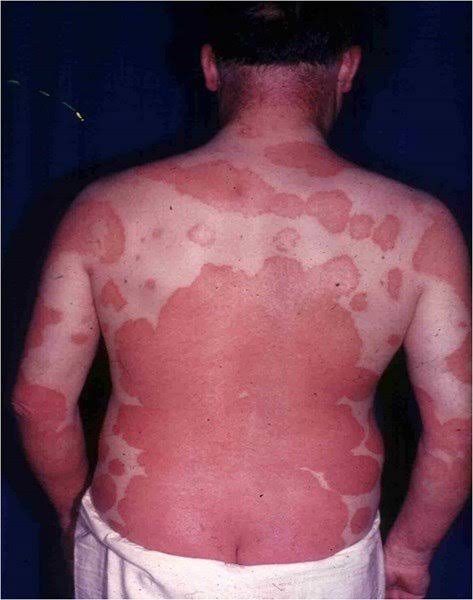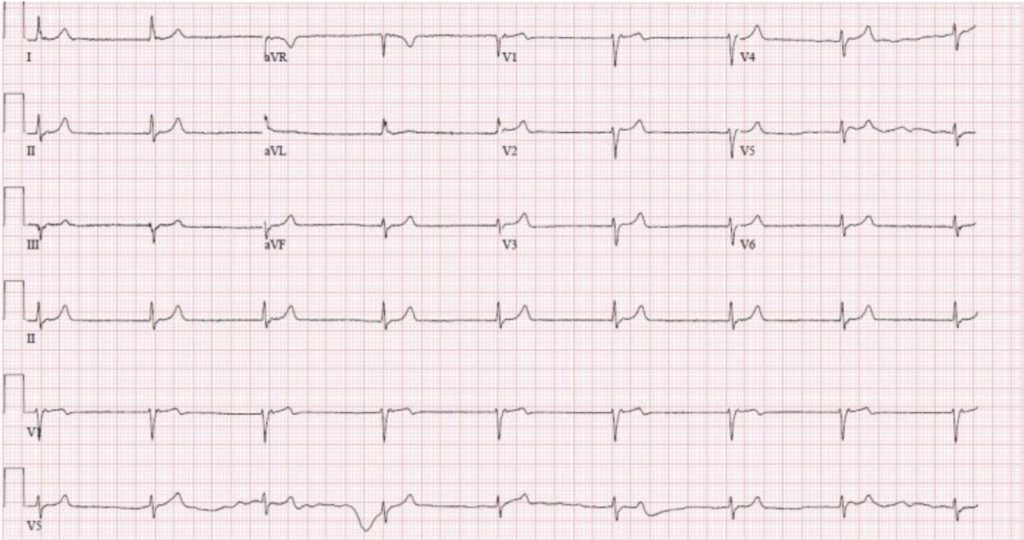History
A 52-year-old man presented to the dermatology clinic with extensive redness and scaling of the skin, covering approximately 90% of his body surface area. He reported the following:

- Chief Complaints: Severe itching, burning sensation, and skin pain lasting for two weeks.
- Medical History: Long-standing history of plaque psoriasis managed with topical treatments and intermittent phototherapy.
- Recent Changes: Noted a sudden exacerbation of his condition following discontinuation of systemic corticosteroids.
- Family History: No family history of psoriasis or other autoimmune conditions.
- Medications: Recently stopped corticosteroids on his own; currently not taking any other medications.
Examination
On physical examination, several key findings were evident:
- Skin: Diffuse erythema and scaling covering most of the body, with areas of thickened plaques and fissures.
- Nails: Nail dystrophy, including pitting and onycholysis.
- Lymph Nodes: Mildly enlarged cervical and axillary lymph nodes.
- Vital Signs: Mild fever (38°C), tachycardia (110 bpm), and normal blood pressure.
Investigations
A series of investigations were conducted to confirm the diagnosis and assess the patient’s overall health status:
- Complete Blood Count (CBC):
- White Blood Cell Count: 15,000/µL (elevated, indicating leukocytosis)
- Hemoglobin: 10 g/dL (mild anemia)
- Platelet Count: 300,000/µL (normal)
- Electrolytes and Renal Function Tests:
- Sodium: 138 mmol/L (normal)
- Potassium: 3.5 mmol/L (normal)
- Blood Urea Nitrogen (BUN): 30 mg/dL (elevated, indicating dehydration)
- Creatinine: 1.6 mg/dL (elevated)
- Liver Function Tests:
- Aspartate Aminotransferase (AST): 50 U/L (mildly elevated)
- Alanine Aminotransferase (ALT): 55 U/L (mildly elevated)
- Skin Biopsy: Confirmed the diagnosis of psoriasis with findings of hyperkeratosis, parakeratosis, and acanthosis.
- Serological Tests: Negative for infectious causes such as HIV, hepatitis B, and C.
Diagnosis
Based on the clinical presentation and investigation results, the patient was diagnosed with erythrodermic psoriasis, a severe variant of psoriasis characterized by extensive erythema and scaling. The sudden exacerbation was likely triggered by the abrupt discontinuation of systemic corticosteroids.
Overview:
Erythrodermic psoriasis is a rare and severe form of psoriasis characterized by widespread redness and scaling of the skin. This condition can be life-threatening and requires prompt medical attention. Understanding the presentation, diagnosis, and management of erythrodermic psoriasis is crucial for effective treatment.
Causes and Triggers
Erythrodermic psoriasis can result from various triggers and underlying conditions:
- Medication Withdrawal: Abrupt discontinuation of systemic treatments like corticosteroids.
- Infections: Bacterial or viral infections can precipitate the condition.
- Stress: Emotional or physical stress can exacerbate psoriasis.
- Other Psoriasis Treatments: Ineffective or improper use of psoriasis medications.
Approach to Management
Managing erythrodermic psoriasis requires a comprehensive and multidisciplinary approach:
Acute Management
- Hospitalization: Admitted to monitor and manage potential complications like fluid imbalance and infections.
- Supportive Care: Ensured adequate hydration, maintained electrolyte balance, and provided nutritional support.
- Topical Treatments: Applied emollients and corticosteroids to reduce inflammation and provide skin barrier protection.
Systemic Treatments
- Immunosuppressants: Administered cyclosporine or methotrexate to control the immune response and inflammation.
- Biologic Agents: Considered biologics such as infliximab or adalimumab for severe cases unresponsive to other treatments.
Long-term Management
- Regular Follow-up: Monitored for potential relapses and side effects of systemic treatments.
- Patient Education: Emphasized the importance of adherence to prescribed treatments and regular dermatological check-ups.
- Lifestyle Modifications: Advised on stress management techniques and avoidance of known triggers.
Conclusion
Erythrodermic psoriasis is a critical and severe form of psoriasis that demands prompt and effective management. Through a thorough understanding of its presentation, causes, and treatment options, healthcare providers can significantly improve patient outcomes and quality of life.
